Yes, dogs can eat rice noodles as long as they are served plain and without additives. Rice noodles are suitable for occasional treats, but they should be introduced slowly to monitor your pet’s reaction. Always consult your veterinarian before adding new foods to your dog’s diet to ensure they fit their nutritional needs.
Introduction
As a dog owner, have you ever wondered if sharing some of your favorite dishes with your furry friend is safe? One popular dish is rice noodles, commonly enjoyed in many Asian cuisines. “Can dogs eat rice noodles?” is very common among pet owners looking to diversify their diet or share a meal with them. In this guide, we’ll delve into whether rice noodles are safe for dogs, examine their nutritional benefits, and discuss the potential risks of feeding them to your canine companion.
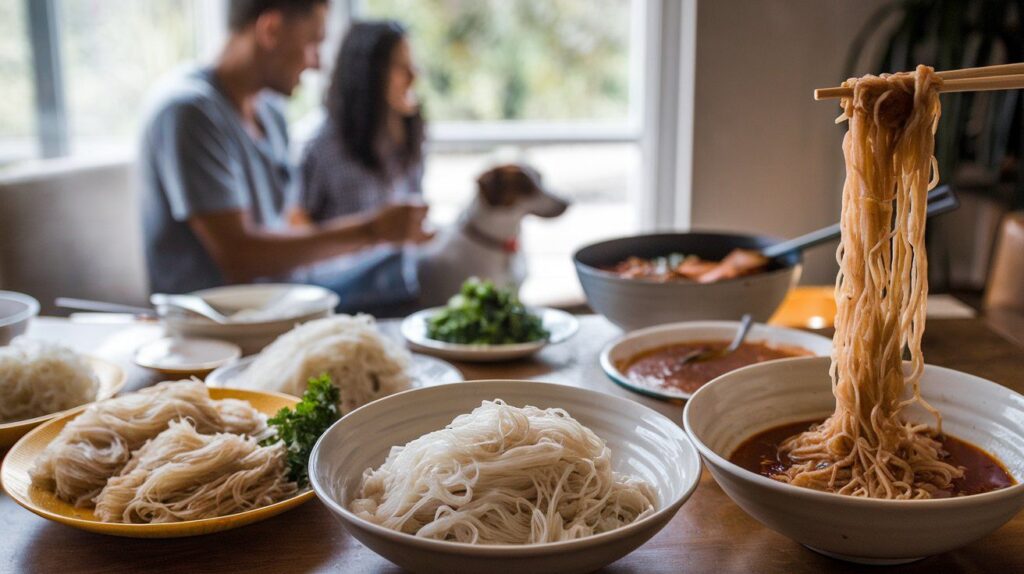
What Are Rice Noodles?
Rice noodles are served in many Asian cuisines. They are known for their versatility and mild flavor, making them a popular choice in dishes ranging from stir-fries to soups. Made primarily from rice flour and water, these noodles are steamed, baked, or boiled to achieve their distinctive soft yet chewy texture. Unlike wheat noodles, rice noodles are naturally gluten-free, an essential consideration for those managing dietary sensitivities.
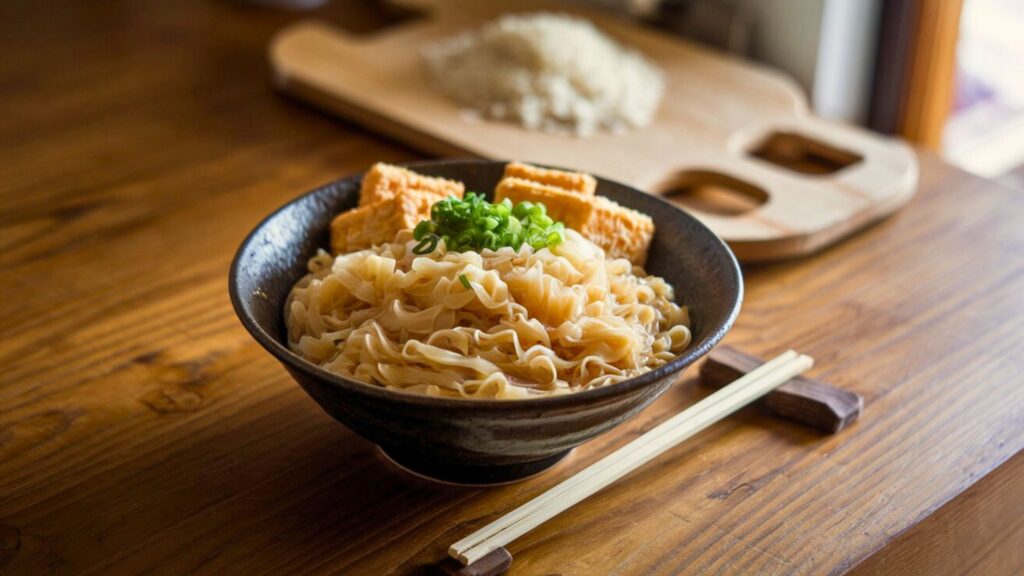
Rice noodles are easy to digest because they have simple ingredients. This might make dog owners think about using rice noodles as a safe source of carbs for their pets, especially if they have sensitive stomachs or grain allergies.
Remember this: “Rice noodles have moderate energy but not as much protein and fat as whole grains. Whole grains are better for dogs because they have more fiber and essential nutrients. However, dogs with grain allergies can eat rice noodles in small amounts as a gluten-free option.”
Nutritional Benefits of Rice Noodles for Dogs
Rice noodles may not be the first food that comes to mind when considering dog nutrition. Still, they offer specific benefits that suit a dog’s diet under certain circumstances. Known for their high digestibility, rice noodles can be an excellent carbohydrate source for dogs, particularly those with sensitive digestive systems or allergies to more common grains.
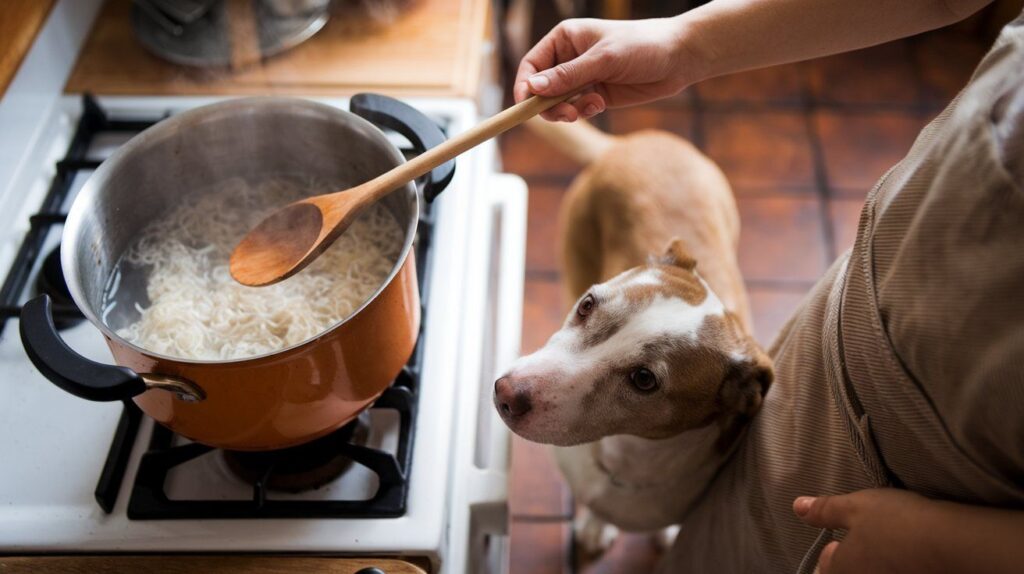
Digestibility:
Rice noodles are composed mainly of rice flour and water, making them exceptionally gentle on the stomach. For dogs that require a low-fat diet or have difficulty digesting heavier grains, rice noodles provide a quick energy source without the burden of hard-to-digest fats.
Low-Fat Content:
If your dog is overweight or needs to manage its fat intake for health reasons, rice noodles can be a beneficial treat. They offer a way to fill up your pet without a significant calorie load, assisting in weight management plans prescribed by a veterinarian.
Hypoallergenic Properties:
Rice noodles are an excellent alternative for dogs allergic to gluten or other grain proteins. They are naturally gluten-free, reducing the risk of allergic reactions and making them a safe choice for sensitive dogs.
However, it’s important to note that rice noodles should not replace a dog’s diet’s essential proteins, fats, and micronutrients. They are best used to supplement a well-balanced diet tailored to your pet’s nutritional needs. Rice noodles can serve as an occasional treat or carbohydrate alternative but should be given in moderation to avoid disrupting the balance of a nutritionally complete canine diet.
Risks of Feeding Rice Noodles to Dogs
While rice noodles can be a benign addition to your dog’s diet if managed properly, dog owners should be aware of several risks to ensure their pets remain healthy and well-nourished.
Nutritional Imbalance:
One significant concern with feeding rice noodles to dogs is the risk of nutritional imbalance. Rice noodles primarily provide carbohydrates and very little protein or fat, which are crucial for a dog’s diet. Relying too much on rice noodles can lead to deficiencies in essential nutrients, particularly if they displace more nutritionally complete foods.
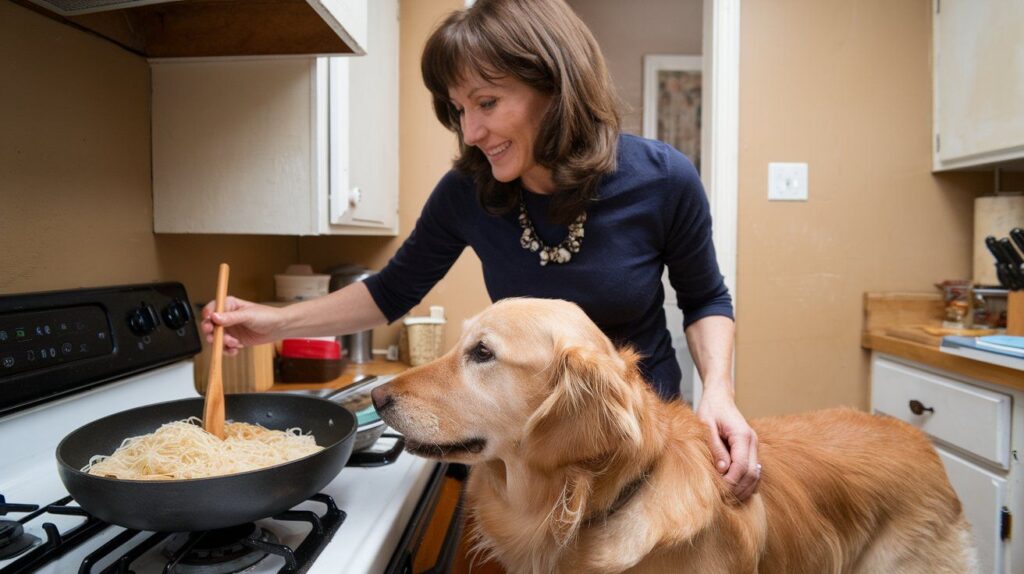
High Carbohydrate Content:
Dogs, unlike humans, do not require a high-carbohydrate diet. Excessive carbohydrates, like those found in rice noodles, can lead to weight gain and associated health issues such as diabetes, particularly in less active dogs. Balancing their diet with adequate protein and fats is crucial to supporting their overall health.
Potential for Additives:
Many commercially available rice noodles may contain additives or seasonings that are harmful to dogs. Ingredients like onion, garlic, and excessive salt, often found in pre-packaged rice noodle dishes, can be toxic to dogs. Always ensure that any rice noodles fed to your dog are plain and free from these harmful additives.
Digestive Issues:
Although rice noodles are generally easy to digest, overfeeding can cause digestive upset in some dogs. As with any new food, it should be introduced gradually and monitored closely to see how your dog reacts before making it a regular part of their diet.
Moderation is key when incorporating rice noodles into your dog’s eating plan. They should never be a staple but can serve as an occasional treat or carbohydrate variation in a well-rounded diet.
How to Safely Introduce Rice Noodles into Your Dog’s Diet
Introducing rice noodles into your dog’s diet should be done cautiously to ensure a safe and enjoyable experience for your pet. Here’s how you can safely incorporate this food:
Start with Small Amounts:
Start with small portions of plain, cooked rice noodles to monitor your dog’s digestion and check for any adverse reactions.

Observe and Evaluate:
Watch your dog for itching, digestive problems, or tiredness after giving them rice noodles. If these signs appear, stop feeding them rice noodles and talk to your vet.
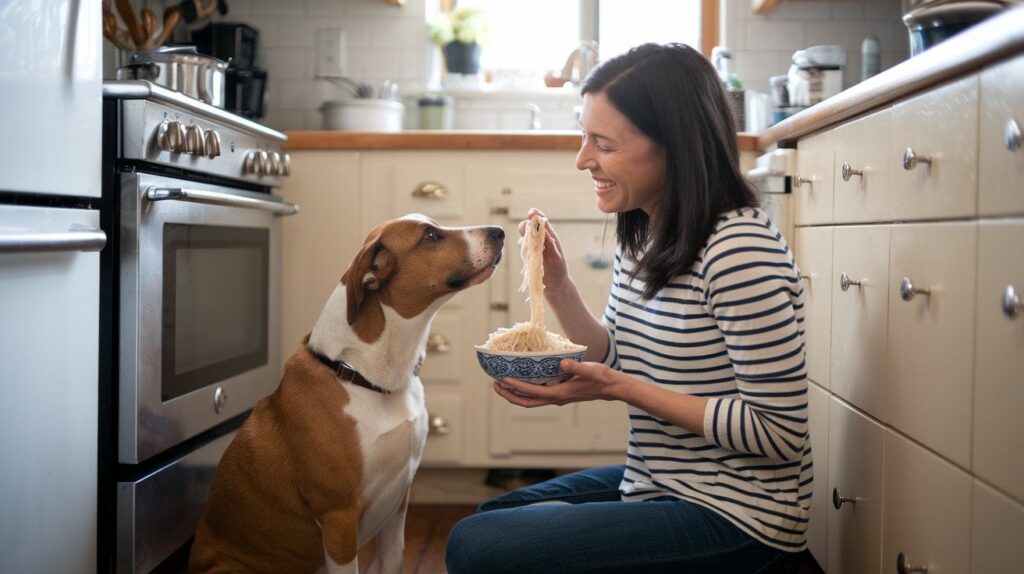
Consult Your Veterinarian:
Consult your vet before adding rice noodles to your dog’s diet.
Gradual Integration:
If your dog tolerates rice noodles well, you can slowly increase their amount. Nevertheless, these noodles should only make up a small fraction of a diet that’s rich in high-quality proteins and fats crucial for your dog’s health.
Avoid Seasonings and Additives:
Ensure that the rice noodles are plain and do not contain any seasonings, additives, or ingredients that are harmful to dogs, such as onions, garlic, or excessive salt. These can be toxic and potentially lead to serious health issues.
Alternatives to Rice Noodles for Dogs
While rice noodles can be a harmless treat for your dog, there are healthier alternatives that provide better nutritional value and pose fewer risks. Here’s how some nutritious options can serve as excellent substitutes:
Whole Grains:
Whole grains are a fantastic alternative to rice noodles, as they often contain more fiber and essential nutrients beneficial for dogs. You might consider incorporating grains like:
- Brown Rice: Brown rice is high in fiber and rich in B vitamins, which support overall health.
- Barley: With a low glycemic index, barley is excellent for dogs with diabetes or those managing their weight.
- Oats: Gentle on the stomach and high in fiber, oats are well-suited for dogs with grain sensitivities.
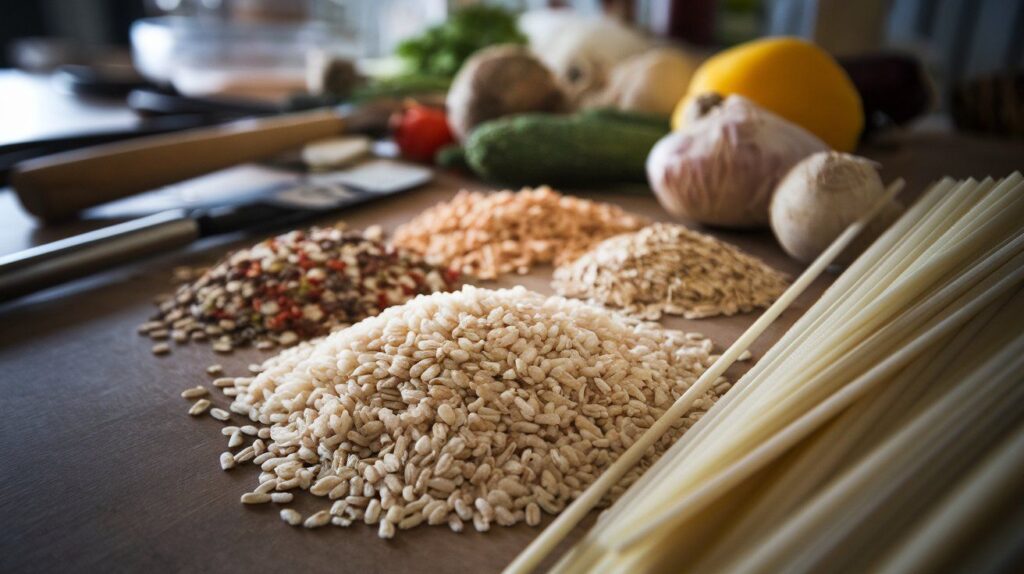
Vegetable Noodles:
Creating noodles from vegetables provides a low-calorie, nutrient-rich alternative to rice noodles. Vegetables that can be easily transformed into noodles include:
- Sweet Potatoes: Packed with dietary fiber and vitamins, sweet potato noodles are both tasty and nutritious.
- Zucchini: Low in calories and hydrating, zucchini can be spiralized into vitamin-rich noodles.
- Carrots: Carrots are high in fiber and beta-carotene, and they promote good vision and dental health.
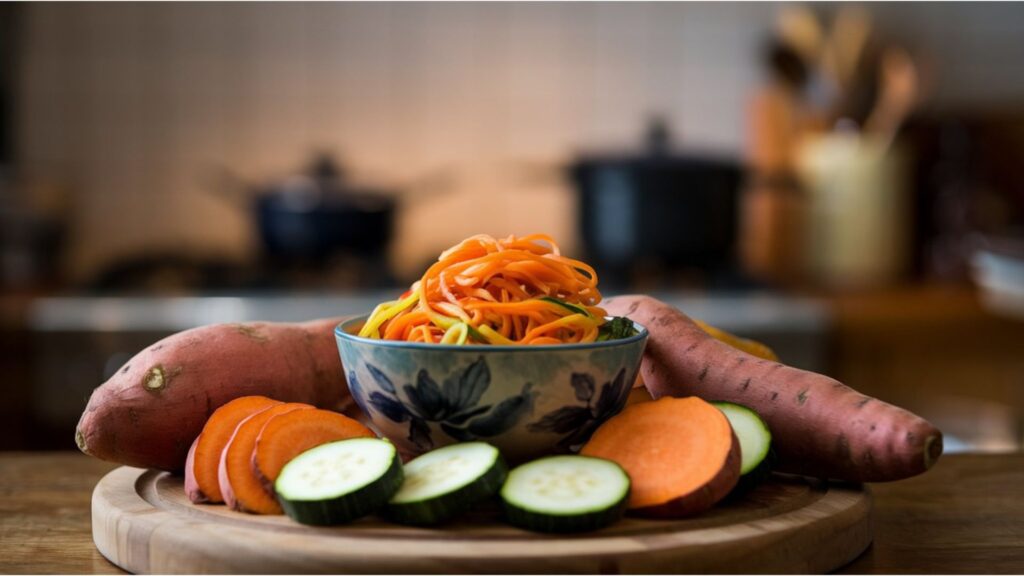
Legume Pasta:
Pastas made from legumes like chickpeas or lentils offer more protein and fiber than rice noodles, presenting a more balanced option for your dog’s diet.
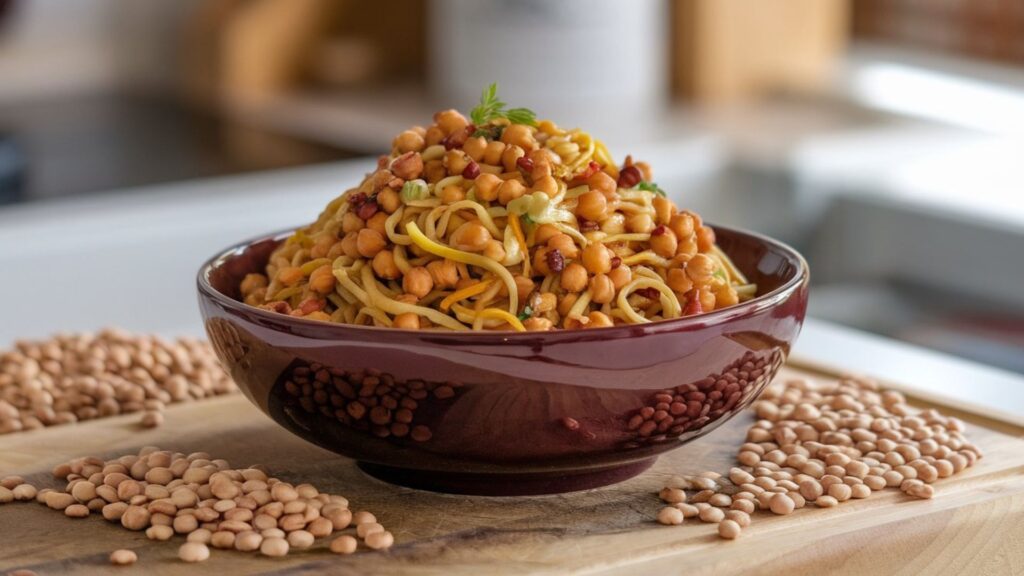
In addition to these alternatives, incorporating certain raw meaty bones and organs can be beneficial for dogs, though precautions are necessary:
- Chicken Bones and Necks: Raw chicken bones and necks can provide calcium and help clean teeth but must be fed under supervision to avoid choking.
- Beef Heart and Kidney: These organ meats, such as raw beef heart and kidneys, are rich in protein and essential nutrients that support muscle development and kidney health.
- Chicken Feet: Chicken feet are excellent for joint health due to their high collagen content.
- Beef Fat: In moderation, beef fat is a good energy source, but too much can lead to pancreatitis.

When introducing any new food, including these alternatives, start slowly and monitor your dog’s reaction to ensure they tolerate the change well. Before significantly adjusting your dog’s diet, consult your veterinarian to ensure these changes align with their nutritional needs.
Conclusion
While rice noodles are not harmful to dogs and can be offered as an occasional treat, especially for dogs with grain allergies or sensitive stomachs, they should not be a dietary staple due to their lack of essential nutrients. Plain, additive-free rice noodles can be introduced gradually to ensure they are well-tolerated. However, healthier alternatives like whole grains and vegetable noodles are recommended for their superior nutritional value.
Rice noodles can serve as a gentle carbohydrate source for dogs with specific dietary needs, such as those with grain allergies or sensitive digestive systems. However, it’s crucial to ensure that these noodles are plain and free from any additives or harmful seasonings like onion or garlic. Always introduce them gradually and in moderation, observing your dog’s reaction to ensure they do not experience any adverse effects.
We also discussed healthier alternatives, such as whole grains and vegetable noodles, which can provide greater nutritional benefits and pose fewer risks. These alternatives support a balanced diet more effectively than rice noodles and can be easily incorporated into your dog’s meals.
Ultimately, the decision to include rice noodles or any new food in your dog’s diet should be made with guidance from a veterinarian. They can offer personalized advice based on your dog’s health, nutritional needs, and existing dietary restrictions. By prioritizing your pet’s health and nutritional balance, you can ensure they lead a happy, healthy life.
Frequently Asked Questions
Can dogs eat cooked rice noodles?
Yes, dogs can eat cooked rice noodles in moderation. They are generally safe for dogs if served plain, without any harmful additives, sauces, or seasonings that could be toxic. However, rice noodles should not become a regular part of their diet as they are high in carbohydrates and lack essential nutrients like protein and fat that dogs need
Are rice noodles good for dogs with sensitive stomachs?
Rice noodles can be suitable for dogs with sensitive stomachs due to their easy digestibility and low-fat content. They can be an occasional treat or an addition to a bland diet for dogs recovering from digestive issues. However, it is essential to consult with a veterinarian before introducing new foods to ensure it aligns with the dog’s dietary needs
How often can I feed rice noodles to my dog?
Rice noodles should only be given to dogs occasionally and in small portions. They should not replace nutritionally dense foods in a dog’s regular diet. Monitor your dog’s reaction after introducing rice noodles and consult a veterinarian if any adverse symptoms appear.





